#torture mention
Text

I respect and appreciate whumpers who are like this.
595 notes
·
View notes
Text
Whump drabbles, 3/100: burnout.
Caretaker hid their face in their hands, a pitiful attempt to hide their tears from Whumpee, who had just entered the room.
“You should be sleeping,” Caretaker mumbled.
Whumpee wasn’t supposed to see this side of them. No weakness. No sadness. Whumpee was the one who had suffered, been tortured – Caretaker should be able to handle this.
Whumpee quietly sat beside them. “It’s me, isn’t it?”
Of course not, Caretaker wanted to say, but all they managed to choke out was: “I’m sorry.”
“It’s okay...”
“It’s not.”
“Caretaker,” Whumpee whispered, placing their hand on Caretaker’s shoulder. “You’re only human, too.”
#100x100 whump drabbles#torture mention#emotional whump#exhausted caretaker#whump drabbles#whump scenarios#whump tropes#whump ideas#whump#whumpblr
228 notes
·
View notes
Text
Kim Rok Soo didn't transmigrate, he died in the attack where he was meant to and reincarnated as one of the orphans in Toltz territory.
With his sticky fingers and predilection for sticking his nose in everyone's business, he actually found out when Venion had a dragon egg, of all things, being wheeled through the territory.
And, naturally, he realized exactly what was meant to happen to that dragon.
So he concocted an elaborate plan and tried to steal the egg, only for it to hatch at the worst possible time and for both of them to get caught.
Kim Rok Soo and the little dragon are chained up and tortured, instead of just the little dragon.
Rok Soo antagonizes Venion to take the heat off of the dragon, and the dragon in turn does the same when it's been too much for Rok Soo.
Then, three years after his capture, the entrance caves in as Choi Jung Soo and Lee Soo Hyuk stand in the rubble, wild eyed and pissed.
They'd been transmigrated, and had only been in the world for seven months.
They'd bullied the God of Death into telling them where Rok Soo was.
Soo Hyuk had straight up punched the God of Death in the face the second the phrase "dungeon" left the god's mouth.
They'd been searching for him the entire time, bullied a counts son for political information, bullied Choi Han into being their interpreter, punched their way through so many guards that if it hadn't been for the count's son's money they definitely would have been on wanted posters, and they'd just found him chained and beaten.
Rok Soo thinks it's fantastic; he gets reunited and also gets to leave.
Soo Hyuk and Jung Soo think...well. Not a lot, really. They saw a tiny Rok Soo beaten to hell and their minds kind of went blank.
By the time they come back to themselves Venion is in pieces. Literally.
#tcf#lcf#trash of the count's family#lout of the count's family#story prompt#torture mention#abuse mention#as far as Raon is concerned he and Rok Soo are brothers
154 notes
·
View notes
Text
#poll#polls#my polls#my poll#death mention#tw death#tw torture#torture mention#tumblr poll#hyperspecific poll#spies are forever#owen carvour#saf#tin can bros#tin can bros saf
207 notes
·
View notes
Text

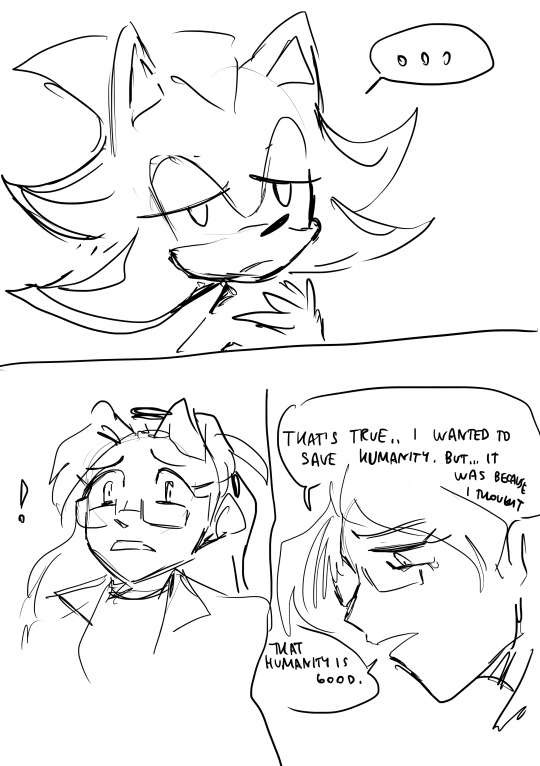

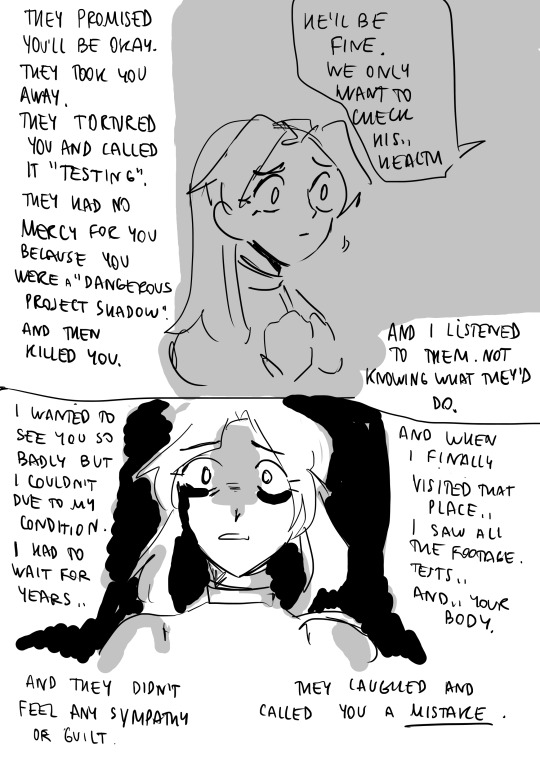

#sth#maria robotnik#shadow the hedgehog#low effort comic#low effort#au#torture mention#death mention tw
161 notes
·
View notes
Text
Nineteen Eighty-Four by George Orwell
Wow. There is...there is so much here.
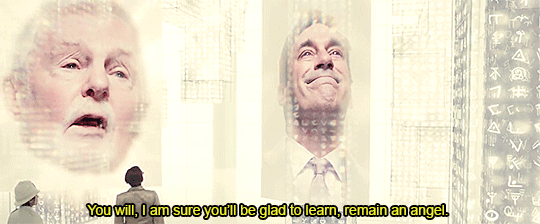
First, a caution about the book itself: there is significant sexually violent narration, and lots of torture as well. This post is going to discuss these topics only in general terms - I don't think I need to go into detail to discuss what they mean for the story - but take care of yourself when you're deciding whether to read it. If you have any questions, always feel free to send an ask or message.
I am going to need to make multiple posts about this book. For this first one, I'll focus on summarizing the book and its main themes, especially the ones that I think relate to Good Omens. As always, I can't summarize it in a way that will give you a better understanding than simply reading the book, but summarizing it will help me put my own thoughts together and hopefully help you follow along as I try to articulate them.
Because it's impossible to miss, I think it is best to confront this issue at the outset: there is a lot of especially blatant misogyny on Winston's part in Nineteen Eighty-Four. This is not meant to be a good or sympathetic thing. It is a demonstration of how messed up he is, and how messed up everyone in that society is.
The Society
The plot of Nineteen Eighty-Four is tied up very much in the story's world. The characters are at the mercy of their society in this story, much more than in most. It will make sense to describe the world first. Indeed, a massive portion of the book is just information about Oceania itself.
In the world of Nineteen Eighty-Four, the entire planet is supposedly ruled by three perpetually warring authoritarian states: Oceania, Eurasia, and Eastasia, conglomerations of Earth's former independent nations. Through the novel, it is revealed that all three states have governments that are structured in largely the same way with approximately the same quality of life for their people, and the perpetual war is itself a way of controlling each population.
Technically, we don't know for sure that the war is really happening. In fact, we don't know that anything is true, because almost all the information the characters have comes from the Party, the government of Oceania, and the Party's operations revolve around reality control. The Party's "leader" is an enigmatic figure referred to only as Big Brother, who, of course, is watching.
Our protagonist, Winston, lives in Oceania. There are Inner Party members, who are the highest-ranking, with the highest responsibility and the highest quality of life. There are Outer Party members, who work for the Party, are heavily surveilled, and whose daily needs are all provided for with low-quality supplies; they have a highly regimented daily schedule. Inner and Outer Party members have telescreens, which broadcast Party propaganda but also have cameras to monitor all Party members. It is incredibly difficult to get away from telescreens, since there's at least one in every home and they're everywhere in public. Altogether, the telescreens form a panopticon that is hard to evade.
Then there are the proles, a shortened term for proletarians, who are the lower classes of Oceania and make up the majority of the population. The proles live in poor conditions and are constantly manipulated by State-generated propaganda. However, they have more freedom than Party members, in the sense that they are also largely ignored by the Party because they have no real power and are assumed to be incapable of engaging in revolutionary behavior. For this reason, proles get to have human relationships and enjoy pleasures, wherever they can find pleasures, in ways that Party members are not allowed. In reality, the Party's perpetual war is a way of grinding through resources in order to keep people, especially the proles, buried under work without improving their quality of life. This is because when people have free time, they can use it to learn and organize, and they might become a threat to the Party.
Winston is one of the Outer Party members. He works in the government department that rewrites history. See, every time a fact or anecdote in the media is inconvenient for the Party, the Party goes back and destroys all old copies of newspapers and books, all old video content, all paperwork, any scrap of evidence that anything was different. Newspapers are routinely reprinted with "updated" (falsified) information. For example, Oceania is always either at war with Eurasia and allied with Eastasia, or at war with Eastasia and allied with Eurasia, and as far as the Party is concerned, this has never changed. Every single time Oceania's alliance changes, the newspapers are updated so that the current alignment has always been true. Every time someone becomes a disgrace to the Party, their previous deeds are rewritten.
On the surface, this sounds difficult to implement, but over the story, one realizes the vast majority of the Party's operations revolve purely around the constant reshaping of history, control of people's memories, and control of people's emotions for the purpose of maintaining power eternally. Art produced by human beings is actively discouraged; instead, the Party mass-produces art, including novels, using machines, to control what kinds of ideas people are consuming.
The Party is essentially a machine that controls reality, or at least, what the people inside it consider to be reality. There are people who specialize in managing the thoughts of the public: the Thought Police. While they may technically not be able to literally see inside one's mind, they watch everyone carefully and are excellent at noticing everything: every facial expression, every eyebrow twitch, and every breath.
The Party rules through a series of four "ministries." These are the Ministry of Truth (like an educational ministry, responsible for producing propaganda), the Ministry of Peace (like a military, responsible for warfare), the Ministry of Love (like the correctional system, responsible for jailing and torturing dissidents), and the Ministry of Plenty (like the treasury, responsible for rationing).
When it suits the Party, anyone can be "vaporized." This means they are secretly murdered and all evidence of them - any existing record whatsoever, any news story, any list or database entry - is erased.
The Party has a new language they're developing as a method of thought control called Newspeak. The purpose of Newspeak is to make it impossible to articulate certain kinds of thoughts. The following is a character named Syme describing Newspeak:
"Don't you see that the whole aim of Newspeak is to narrow the range of thought? In the end we shall make thoughtcrime literally impossible, because there will be no words in which to express it. ... In fact there will be no thought, as we understand it now. Orthodoxy means not thinking - not needing to think. Orthodoxy is unconsciousness."
It's worth noting that Syme is later vaporized, presumably just for being too insightful out loud about Newspeak. In Newspeak, people who have been vaporized, if they must ever be referred to at all, are called "unpersons." In this way, no one has ever been killed by the Party, because those people have never existed in the first place.
There's a key Newspeak word that appears over and over: doublethink. It's the ability to believe two contradictory things simultaneously, and unlike the way we usually experience cognitive dissonance, there is no urge or attempt to reconcile what is really true. With doublethink, the existence of two contradictory ideas at once is itself exploited to help Party members serve the Party.
The Party (and its equivalents in Eurasia and Eastasia) uses perpetual war to control the population by squandering the resources produced by human labor and keep people in a perpetual combination of patriotic fervor and fear. The war is infinite and can never be won; the whole purpose of the war is to be at war.
Socially, the Party has destroyed family life. Winston was married years ago. He and his wife are so estranged that he is no longer sure if she is alive. They did not have a good relationship. The Party does not want close emotional relationships between its members, so while they are strict about who is allowed to marry (not for love, strictly for procreation), they don't care if people continue to live together. However, the Party does not want people forming new relationships, so divorce and extramarital sex are also illegal. The Party has also turned children against their parents by encouraging children to report their parents' potential thoughtcrimes. All in all, family members are generally afraid of each other.
We see, over and over again, how the Party does its best to frame human beings as both inherently untrustworthy and as objects to be used. Pitting people from individual family members to entire classes, sexes, and races against each other is one of the Party's many techniques for controlling people, and it has seeped into Winston's everyday thought processes. Only actual experiences with other human beings even begin to break these ideas down.
Eventually, it becomes apparent that the Party's motivation is immortality through the denial of the individual. Human beings are denied their own personal thoughts, feelings, and bodies. Only their ability to be assimilated into the Party is permitted. Even thoughts and feelings about the greater good are unacceptable because these lead to regime changes and interfere with the raw totalitarian power of the Party. Every Party member in Oceania is meant to strive exclusively for the continued power of the Party. Dissidents are denied even the ability to be martyrs, because the Party does not kill people while they carry hatred for Big Brother; they simply change their thoughts until they are good Party members again, and then kill them later, when they are no longer dissidents and have no legacy of resistance to leave behind.
Winston's Plot
Winston has a secret desire to be free of the Party. He does get swept up in the Party's fervor when he's in the middle of it, but he also longs for the extremely basic pleasures and freedoms that have become taboo. For example, Winston secretly buys an old pen and journal to write in - a completely forbidden act that he has to conceal from the telescreen in his own apartment. He finds himself almost unconsciously writing things like "DOWN WITH BIG BROTHER" in that journal.
There is an Inner Party member named O'Brien who Winston admires greatly from a distance despite knowing only his appearance: "intelligent" with a "prizefighter's physique." Winston perceives that he and O'Brien "understand" each other somehow, and even believes O'Brien has spoken to him in a dream, saying they "shall meet where there is no darkness." Eventually, Winston imagines he is addressing his journal to the mysterious O'Brien, believing him to be an ally.
Winston has an acquaintance at work named Syme. Syme is very passionate about revising the Newspeak dictionary. However, he is a little too openly insightful about the true purpose of Newspeak for his own good. Even though Syme does not seem to have any intention of betraying the Party and in fact is extremely taken with Newspeak, Winston is convinced he will be vaporized, and sure enough, he is.
There is a woman Winston thinks he hates because she looks like the perfect Party member who would turn him in to the Thought Police. Actually, the narration outright states that he doesn't like women entirely, because he thinks they're too committed to the Party and enjoy betraying men. However, it turns out that this woman observes Winston by the shop where he bought his illegal notebook. By simply observing Winston in that shop, the Party would suspect he's committing thoughtcrimes, and Winston panics. However, the woman later bumps into Winston at work and passes him a note that says, "I love you." Winston then instantly decides he wants to be with her; the idea of not being with her never even occurs to him.
The woman's name is Julia. It turns out Julia is putting on an incredibly convincing act, but she hates the Party, too. Winston is technically married, so he can't legally marry Julia, and any kind of non-procreative sex is illegal anyway, so their relationship is entirely forbidden.
Winston and Julia meet up and have sex in secret. It's worth noting that during their first meeting, they enjoy listening to a thrush singing. During this first meeting, they go out to the countryside, where there are fewer telescreens and microphones; Winston comments that it's like the "Golden Country," his symbolic dream-place where people are free.
A man named Mr. Charrington owns the shop where Winston had bought his notebook, and he also owns a room for rent above the shop. It's an old-fashioned prole room without telescreens and with a great number of old-fashioned fixtures. Winston and Julia rent it to get away from Party life for a few hours every now and then. When they first start staying in the room, Julia observes a rat and throws her shoe at it. Winston is utterly terrified, showing that he has a serious phobia of rats; it is vaguely implied that he had a traumatic moment related to them as a child. Julia takes the rat in stride; they are everywhere. She promises to block up the hole so the rat does not return.
Julia and Winston spend time in their prole room knowing for sure that it will eventually lead to their capture, torture, and death, but they decide it will be worth it. Winston voices some interest in trying to work against the Party; Julia does not believe this is possible whatsoever, and is not interested in trying. She believes people are better off putting on a convincing act and getting away with as much as they can for as long as they can.
Meanwhile, during the workday, O'Brien speaks to Winston. He mentions Syme without using his name, which is incredibly unusual, since people who are vaporized are never ever acknowledged again; all their work is erased from history. But O'Brien mentions Syme's work on the Newspeak dictionary and gives Winston his home address so that Winston can borrow the dictionary. Party members also don't often give each other their addresses. Because of these unusual cues, Winston infers that O'Brien is inviting him over to conspire against the Party.
While Winston and Julia meet up and have sex, they also indulge in other pleasures of the world, like real coffee and chocolate, and proles singing outside their window, and art that hasn't been generated by the Party. Observing the proles and their richer emotional lives, Winston and Julia decide they are going to worry only about their feelings. The Party can coerce them to do anything, including to confess, but as long as the Party can't make them stop loving each other, they agree, they will never have betrayed each other. Julia says that for all the things the Party can do, they can't get inside their heads.
So seized are Winston and Julia by their conviction that they decide to go visit O'Brien together and confess to wanting to destroy the Party. O'Brien tells them they may join the Brotherhood, a mysterious group of dissidents working to bring down Big Brother, but they must be willing to sacrifice everything; they must be willing to not only suffer and die, but to murder civilians, to spread disease, to sow discord, to do anything the Brotherhood asks of them. They even, O'Brien says, must be willing to "separate and never see one another again." This is the only thing Julia and Winston are unwilling to agree to. O'Brien accepts them anyway and, many days later, gives Winston a book through a secret messenger.
This book contains the writings of Goldstein, the supposed leader of the Brotherhood, outlining the Party's core philosophy. Winston reads this to Julia, who is hinted to not be all that interested, but she does listen a little.
While they look out the window and contemplate that the proles are alive and the Party members are already dead, Winston and Julia are captured. It turns out Mr. Charrington was a member of the Thought Police and the room had surveillance in it. Winston and Julia are separated and dragged to the Ministry of Love.
While at the Ministry of Love, Winston spends a lot of time waiting, watching other prisoners pass through. Some of them are proles, and some of them are people he knows. The waiting room is enormous and brightly lit with telescreens on all walls. There are essentially no shadows.
Another familiar face appears at the Ministry of Love. It's O'Brien. Winston first thinks O'Brien has been captured, but it soon becomes apparent that O'Brien was masterminding this whole operation and is in charge of Winston's torture. They have, indeed, met "where there is no darkness" - because of all the telescreens and artificial lighting. O'Brien and other Party members even wrote Goldstein's book as yet another propaganda piece. O'Brien states the description of the Party in the book is true, although the book's implication that the Party can be defeated through a prole uprising is false because a prole uprising will never happen. (Note that Winston did not actually read the part of the book where "Goldstein" outlined how the Party should be defeated.)
Winston is tortured for an undetermined amount of time. He discovers that he is a prisoner of his body; his torturers can get him to say pretty much anything through punishment and reward. In fact, they can force him to feel certain ways, too. O'Brien and the Party aren't only trying to get Winston to give away information; they want him to really internalize sincere belief in the Party doctrine, like doublethink, symbolized by the concept that 2+2 equals 5.
Winston starts out promising to himself there are certain things he will never agree to or say out loud, but torture proves an effective method at getting him to say whatever O'Brien wants. Winston vows that he will recite the Party lines, but will not actually believe them. If he lies to get the torture to stop but still retains his ability to reason for himself, Winston believes, then he can beat the Party.
However, O'Brien and the torturers are slowly able to break that down, too, as they are good at reading Winston's emotions, and they torture him every time he recites their desired lines without the sincere belief they're looking for. Winston is highly resistant to the 2+2=5 idea, but as he is tortured over and over, he does come to believe that because the Party can define his reality through brute force, then 2+2=5 could very well be true. They can force it to be true. He has no choice but to believe it, because only believing it might possibly end his torture, and the torture must end.
In other words, Winston and Julia were wrong. The Party can, in fact, get inside your head.
When Winston starts to believe 2+2=5, O'Brien does indeed start to improve his treatment of Winston, providing him with food and comfort, allowing Winston to become much healthier over time. This bonds Winston to O'Brien and makes him feel attached. However, Winston has not forgotten Julia, and in an unguarded moment, he cries out for her. This prompts O'Brien to ask Winston his feelings, again, about Big Brother. Winston states that he hates Big Brother.
It is at this moment when O'Brien sends Winston to the notorious Room 101.
In Room 101, prisoners face their worst fears - which, of course, the Party knows, because they know everything about everyone. Winston, who we know has a phobia of rats, is shown a pair of cages with starving rats in them. He is told that the rats are, as everyone in this world knows, flesh-eaters, despite being rodents. Winston is restrained, his head held in place, and O'Brien informs him that the rats will be released to eat his face.
Winston realizes what O'Brien wants to hear: he realizes his torturers will probably not allow the rats to eat him if he is willing to inflict the torture on Julia instead. They want Winston's betrayal of Julia to be complete. They want him to stop caring for her, the one thing he and Julia had once agreed they would never, ever do. And Winston has reached his limit: he cannot tolerate the idea of being eaten alive specifically by rats. So Winston says, "Do it to Julia! Not me! Julia!"
And then he is finally let go.
We continue with Winston once again living on the outside. He has seen and spoken to Julia, who was also let go. But the bond between them is completely broken. Julia admits she also betrayed Winston when she was faced with Room 101.
"Sometimes," she said, "they threaten you with something---something you can't stand up to, can't even think about. And then you say, 'Don't do it to me, do it to somebody else, do it to so-and-so.' And perhaps you might pretend, afterwards, that it was only a trick and that you just said it to make them stop and didn't really mean it. But that isn't true. At the time when it happens you do mean it. You think there's no other way of saving yourself, and you're quite ready to save yourself that way. You want it to happen to the other person. You don't give a damn what they suffer. All you care about is yourself."
"All you care about is yourself," he echoed.
"And after that, you don't feel the same toward the other person any longer."
"No," he said, "you don't feel the same."
In other words, by demonstrating to Winston and Julia that they ultimately cannot escape their own self-interest, O'Brien has caused them to reject each other.
At the tail end of the book, Winston is sitting in his usual spot at a place called the Chestnut Tree Café, pondering a happy moment from his childhood before pushing the memory away, believing it to be a false memory. When an enormous military victory is announced on the telescreen, Winston realizes that he finally, truly loves Big Brother.
Interpretation of the End
Although the events at the end of the book are pretty straightforwardly described, I found them slightly confusing on an emotional level. Winston and Julia aren't really angry at each other for their betrayals, it doesn't seem - in fact, they admit to each other that's what happened, and they agree on their mutual experience. But they don't love each other anymore, and Winston loves Big Brother instead.
So, here is my initial thought on what the characters went through:
For people to love each other, both need a sense of individuality. There needs to be a connection, but there also needs to be a specific You and a Somebody to love, to connect to.
Through torture, O'Brien has effectively torn away Winston's individual sense of self. I know that's a weird thing to suggest when the book repeats "all you care about is yourself" multiple times, but I think that by so completely obliterating Winston's ability to make anything resembling his own decision, O'Brien has essentially made "Big Brother" and "Winston ('yourself')" the same person. Big Brother's wishes are Winston's wishes. Winston has been assimilated into Big Brother. Winston and Julia's conversation at the end describes what it feels like to be liquidated as a person and assimilated into a collective.
Winston now knows that the one core impulse he can never escape is self-preservation, and the only one who can provide that, with infinite military might and an infinitely-deep torture repertoire, is Big Brother. Julia represents the ideal that caused Winston to estrange himself from the safety of embracing and trusting Big Brother. And because Big Brother is both eternal and almighty, giver of both life and death, he is the only one it is safe to trust.
By betraying Julia, Winston discovered that his own will inherently had limits; because he would always, eventually, revert to self-preservation, his will and therefore his identity became synonymous with the force that decided whether to preserve him. That's why the end of the novel involves Winston imagining that he has finally been shot in the head and killed; he has experienced the death of his sense of self. And this is exactly how "Goldstein's" book indicated the Party's operations work: eliminate individuals and assimilate them into a collective to achieve immortality.
Character and Faction Parallels Between Nineteen Eighty-Four and Good Omens
The Party and Heaven and Hell
They're both the one overarching power over everyone's existence. The inner workings of it are mysterious to the characters and even moreso to the audience. The main characters are agents working for these entities, and they are controlled through surveillance, punishment, and reward.
Although Heaven and Hell give the impression of being two large overarching powers, it seems apparent to me that the whole thing is really just one system that has intentionally split its workforce into factions. Ultimately I think we will see in the most explicit way possible that whoever is actively calling the shots in Heaven is also actively in charge of Hell.
Winston and Julia, Aziraphale and Crowley
Both pairs are agents who are in love with each other even though they're not supposed to be, who enjoy Earthly pleasures and experience the joys of humanity before getting arrested and dragged away by their authoritarian "employers."
It's tempting to try and figure out which character mirrors which - Aziraphale mirroring Winston, Crowley mirroring Julia? - but I think, sort of like with Nina and Maggie, the reflections work in every direction. The characters aren't literal stand-ins for each other, but they are exploring similar themes, including what happens to people when a society forbids intimacy.
O'Brien and the Metatron
"More even than of strength, he gave an impression of confidence and of an understanding tinged by irony." This line describes O'Brien from Nineteen Eighty-Four, but it sounds quite a lot like the Metatron's manner as he enters Aziraphale's bookshop. Confidence and an understanding tinged by irony indeed.
O'Brien seems to appeal to Winston's ideal in authority figures, appealing both intelligent and physically strong. The Metatron seems to have tailored himself to appeal to Aziraphale's ideal of an authority figure: someone who is calm and in control, but also has an exceptionally gentle manner (and this isn't really true of the Metatron, but he can make it look like it is).
There are more similarities. Winston thinks and hopes O'Brien will be a helpful figure, and O'Brien convinces Winston he's a helpful figure, but in the end, O'Brien is the mastermind behind Winston's capture and torture. Additionally, Winston assumes, during his torture, that the Party's drive for power is for the Greater Good. But O'Brien tells him this is stupid, and the Party's drive for power is just for the pure sake of having power, because that's the only thing that will guarantee the Party's immortality.
This reminds me a little bit of the Metatron telling Aziraphale the point of the war is to win it, not to avoid it. It also hits me as a potential motivation for Heaven - like, why do they do what they do instead of doing something else, since the universe seems perfectly capable of running itself? "Power" or "immortality" could be a reason, and it would also be a reason that would resonate with very human themes, since power and (symbolic) immortality are among the motivations that can drive real-life authoritarians.
The Proles and Humanity
The common people. The populations who are considered by the main characters' societies to be "beneath" them, but who the main characters become fascinated by, and whose lifestyles the main characters come to prefer.
Both Nineteen Eighty-Four and Good Omens contain in their narratives the notion that the prole or human way of life is where true meaning can be experienced. Winston and Julia go as far as to announce that proles are alive and Party members are dead. And at the end of Good Omens Season 1, Aziraphale outright tells Adam that being "human incarnate" is better than being Heaven or Hell incarnate.
This mirror is probably the one that brings up the richest speculation possibilities for me. I won't go in-depth here, but I see in both stories the main characters developing this love for the proles and humans while continuing to separate from them - even trying to turn around and exploit the very power structures that have oppressed them in an effort to fight against the oppression.
It's worth noting that in Nineteen Eighty-Four, Mr. Charrington, the man who Winston and Julia rented their secret love nest from, and whom they thought was a prole, was actually a member of the Thought Police who helped capture them, whereas in Good Omens, so far, the humans have just been humans, and while Adam Young started out as an incredibly powerful non-human, he later chose to be a human and used his power to reject authoritarianism.
The Themes
Authoritarianism and Power
Obviously, the whole overarching cautionary tale in Nineteen Eighty-Four is about authoritarianism and the insidious ways it affects populations. The Party's power is almost as absolute as it can possibly be. Big Brother really is almost always watching; there is almost always a telescreen somewhere nearby. Even when there isn't a telescreen, there are microphones. And unorthodox ideas and behavior are punished with annihilation - not just death, but the total annihilation of the self.
Doesn't this sound like a version of Heaven and Hell in Good Omens?
At first glance, it appears Oceania's Party is more aggressive about surveilling its Party members than Heaven and Hell are about surveilling Aziraphale and Crowley. One has to wonder if perhaps Heaven and Hell are just as aggressive with surveillance in the Upstairs and Downstairs themselves, but are less aggressive or maybe even less capable on Earth, just like the Party's surveillance is less in the countryside (although it is still a significant threat there).
But still, we see Michael pull out those photos of Crowley and Aziraphale through the ages, and we hear the Metatron refer to reviewing Aziraphale's "exploits," and we see Hell drag Crowley down in 1827, and we see both Crowley and Aziraphale anxiously glancing around throughout history with the assumption that someone might be listening, and we see how ready Heaven is to erase Gabriel's memories (his identity! his entire self!) from existence. We also watch Heaven and Hell try to make Aziraphale and Crowley disappear in a gout of hellfire and a tub of holy water after realizing that Aziraphale and Crowley do represent a threat to the current celestial order. Heaven and Hell's Nineteen Eighty-Four-esque insidious threat is clearly established in both seasons.
Vaporizing Dissidents
In fact, Heaven and Hell's arrest of Aziraphale and Crowley reminds me a bit of Winston and Julia's arrest, in the sense that the protagonists knew what was probably coming but not exactly when. And Heaven's attempted execution of Aziraphale in particular reminds me very much of the Party choosing to vaporize a dissident. They were going to try to disappear him. No angel or demon other than the ones who were involved would have known what happened to him. Hell's attempted execution of Crowley, meanwhile, reminds me of the Party's public executions of war prisoners.
Finally, the Party will attempt to erase people from existence by killing them and then erasing all records related to them, down to the very last detail. Meanwhile, the Archangel Michael threatens Aziraphale with being literally written out of existence in the Book of Life. There's lots of speculation about how possible this is. I wonder if maybe, it's a flawed process. Maybe erasing someone from the Book of Life can cut a hole shaped like them in the universe - but maybe it isn't that simple, and they don't actually get taken from anyone else's memories. Maybe, as people in Oceania haven't quite lost the ability to remember their dead, Heaven cannot actually erase the fact of anyone.
Social Disconnection
I see a lot of complaints online about the characters of Nineteen Eighty-Four being impossible to like. What tends to make characters likable? Their behaviors toward others, especially humor, compassion, individual quirks, and affection. Their moral strengths, like a sense of justice, might appeal to us, too. And what has the Party been systematically beating out of people for decades now? Anything that could possibly make fictional characters likable.
One of the Party's primary modes of social control is to keep people from having individual, intimate relationships outside of the Party. Each individual regards every other individual with distrust at all times, and only the Party is capable of providing safety. Winston mentions many instances in which he believes parents are afraid of their children, for example. There are also a number of people who he thinks would report him for thoughtcrimes.
This is getting into heavy speculation territory, but it hits me as a major motivation for the Fall in the first place. It's a great way to instantly divide Heaven itself in half, make everyone instantly suspicious of everyone else, and set up a whole bunch of rewards and punishments to hold over people's heads related to Falling.
One thing that's obvious, though, is the total lack of social connection in Heaven. Michael and Uriel are constantly treating each other with barely-suppressed contempt. Muriel wants approval so badly, but nobody has any patience for them. The "friendliest" any angels get are Gabriel and Sandalphon in Season 1, and that's still like, corporate-coworkers-style friendliness. Gabriel outright tells Beelzebub that no one has ever given him anything. Although it's...theoretically possible Gabriel is an outlier, I think his experience is probably representative of all the angels.
Bodily Experiences, Physicality, Gross Matter
There is a moment that made a big impression on me. Winston observes a prole woman outside singing a silly popular song at the top of her lungs as she works. This woman is not an attractive person by Winston's or Party standards; she is older, she is fat, she has a "lower-class" accent, her skin is weathered and reddened from working outside. But Winston, self-admitted misogynist who came of age on the Party's feminine ideal, thinks she is beautiful. He has a moment of realization that she's beautiful because the very things that theoretically would make her "unattractive" are evidence of a human life fully lived.
We also have Winston and Julia enjoying the world through their senses together in a way that they simply cannot in the grips of the Party. From listening to a thrush in the countryside to drinking real, delicious coffee, they experience pleasures that are denied to them and cause them to feel peaceful in a way that is denied to Outer Party members. As they experience life in a way that is much closer to the ways of the proles, they decide that only proles are alive; Party members are dead. It is at the moment when they speak this out loud that the Party chooses to capture them.
There's a darker side to the bodily experiences explored in Nineteen Eighty-Four, and that's experienced in the Ministry of Love. Here, Winston and Julia discover that their thoughts and feelings are indeed controlled by their bodies. There is only so much pain a human being can withstand before they will comply with their captors just to get the torture to stop. In fact, if the Party's psychological manipulation tactics haven't worked thus far to indoctrinate the population, then the body can be used to brute-force an attitude change.
The connection to Good Omens here is obvious. Aziraphale and Crowley are just like a couple of Outer Party members who haven't experienced real pleasure before, and then they discover wine and ox ribs and music and nice clothes and all those delightful human experiences that the other angels sneer at. It seems Heaven looks down on Earthly pleasure as a morally inferior, dirty pursuit, while Hell looks on Earthly pleasure as a kind of weakness, a pathetic softness. But Earth is where Aziraphale and Crowley have found meaning. Physical existence is where they've found themselves, where they've connected with each other, and where they've connected with the stuff of the universe itself.
Memory Manipulation and Thought Policing
In Nineteen Eighty-Four, there are massive governmental departments dedicated to revising all printed records, including reprinting newspapers as needed. Private writing is also not allowed. This means that even if a Party member has a memory, there is no physical evidence of it. Even if there were physical evidence, something a person had stuffed away in a safe place, there would be another, more "official" source to prove one's personal source wrong. Of course, anyone trying to make any kind of fuss about official sources being wrong would disappear, too, so no one will even try.
Winston mentions often in his narration that he has trouble remembering large portions of his life because of the way the Party has controlled the public narrative and obscured any fact that would once have been a point of reference for him. For example, Winston estimates that the date his journal starts would be April 4, 1984, but he actually isn't certain, not even about the year, because time isn't kept track of by those dates anymore. Historical facts, like events that led to the Party's ascent to power, have been rewritten so many times that Winston can no longer know what really happened. He can be sure there was chaos in the streets, followed by violence, and then proclamations from above about what was supposedly true, but one individual human being usually can't judge the big picture of what's going on in their entire society without a relatively objective source of information for major events.
Nineteen Eighty-Four also has literal thought police, Party members who study their fellow citizens for any sign of even the most remote disagreement with Party doctrine. If someone proves to be a problematic thinker, as Winston and Julia both did, they are dragged to the Ministry of Love to be violently re-educated. Using a series of punishments and rewards, prisoners are slowly broken down until they are unable to think for themselves at all.
Although it's unclear what Heaven is like in regards to spreading information, we've got the Metatron and the Archangels literally ready to erase Gabriel's memory. In Good Omens, since it's all dressed up in Heavenly attire and the characters have their unique attitudes, it comes across as less dystopian, more quirky and fantastical. But they are fundamentally threatening exactly what is done in Nineteen Eighty-Four. And based on Beelzebub's comment about how Gabriel's memory is "all your...you," the same identity issues would be at play. To erase Gabriel's memories would be to erase everything that makes Gabriel himself - an execution by another name.
Reality As A Construct (Or Not)
The Party's stance on reality is fairly simple: human beings perceive reality, so if human perception can be altered, reality can be changed and turned into whatever the Party wants it to be. This sounds wrong because it is wrong, but people who the Party has targeted for thought control don't get to think for themselves about it, because they can't withstand the torture.
This might be Heaven's approach to reality as well. Look at how questioning is discouraged, and how the angels choose to believe whatever is most convenient for Heaven, or whatever they believe should be true ("there are no back channels").
More importantly, though, we have characters in Good Omens who actually can change reality. In particular, this is what Adam Young does - and what he actively chooses not to do for the majority of the world, in the end. He only adjusts reality enough to be allowed to make his own decision: he's not the Antichrist anymore. Otherwise, he restores the world to its state from before he ascended to power (aside from a couple of tiny little eleven-year-old-boy-ish tweaks here and there; hey, you can't blame a kid for adding a few extras of his favorite books to the world).
Proles as the saviors of society
So this one is complicated because repeatedly through Nineteen Eighty-Four, we come across this feeling from WInston and Julia that the proles have some almost mystical connection to True Humanity which Party members have lost. However, there is also the repeated assumption that the proles are incapable of revolution on their own. And in a practical sense, this appears to be true. The intellectuals of their world look down on them for it, but the truth is that just as in real life, the proles are living in poverty and are far too desperate for their basic necessities to ever gain the class consciousness needed to overthrow the Party. This is, of course, by design.
Winston goes as far as to believe the proles might possibly rise up and overthrow the Party, but he never considers working with them. He goes straight into the jaws of the Inner Party instead! This seems to be for a couple of reasons, but primarily because Winston has formed this sort of attachment to O'Brien, his Inner Party member of choice.
In Good Omens, Season 1 and the book, humans do eventually save the world. Well, Adam - technically an Antichrist - saves the world by thinking like a human and accepting humanity as his true "side."
Free Will
"Free will" as a theme really ties into humanity as a theme in Good Omens, since Earth is neutral ground between Heaven and Hell and humans aren't born to a particular Side. In Nineteen Eighty-Four, of course, the Party's goal is to eliminate free will, while in Good Omens, Heaven and Hell are looking to eliminate humanity.
Individualism Versus Collectivism
Oh there it is! There's my pet theme!
I've always argued that in Good Omens, the core of the dualism explored between Aziraphale and Crowley is individualism and collectivism, with Crowley the dedicated individualist who nonetheless would like to belong somewhere, and Aziraphale the nervous collectivist who is secretly desperate to have an identity and belongings to himself. Good Omens has already touched on the notion that working together as a collective is necessary to keep the world turning, but it's also important to preserve individuality, so we have people to keep us company and meaning to live for. I think this will come up again.
Meanwhile, Nineteen Eighty-Four explores an authoritarian and destructive form of collectivism in which human beings are not allowed to have individual interests or experiences; everything flows toward the power of the Party. Individual identity is viewed as a weakness. With that said, Nineteen Eighty-Four does consider the potential power of collectives to overcome authoritarianism.
Mortality, Immortality, and Change
In Nineteen Eighty-Four, O'Brien eventually reveals that the goal of the Party is to become immortal through collectivism. While the fate of an individual human being is always to die, the Party believes a collective that is single-minded enough about maintaining power can live forever. In that way, people who submit to the Party's power can live forever, too. One has to wonder about the real point of all this, of course. The Party regards change as its downfall. For the Party to succeed, it must keep everyone moving toward the exact same goal of maintaining power forever.
In Good Omens, many of the characters are naturally immortal, as angels or demons. They don't have to change, and Heaven and Hell don't have to change. However, existing as immortals in Heaven or Hell, not experiencing any of the things mortals do in the physical world, all seems pretty obviously pointless. Aziraphale and Crowley, and then Gabriel and Beelzebub, and then Muriel, all start to find meaning on Earth among mortals. And I think this is all yet to be expanded upon, especially with the looming Second Coming.
Where Good Omens is concerned, the notion of change as a type of death and/or death as a type of change may be important (and ties into The Crow Road by Iain Banks as well).
By coming to Earth, the immortal characters are essentially doing the reverse of assimilating with the Party or Heaven and Hell: they're discovering themselves. With self-discovery comes the risk of change - changing from who they used to be in Heaven or Hell - and the reward of meaning.
The Party of Oceania wants to assimilate everyone into the same goal of maintaining the Party's power in order to make the Party immortal. While "maintaining power" is a "purpose" of sorts for the collective, on an individual level for any specific human being, it is nihilistic, since there is no place for the individual other than ensuring the success of the Party's destruction of the individual.
Freedom in the Natural World
In both stories, we've got the notion of nature as a place of freedom. The countryside where Winston and Julia first meet up lacks telescreens, and there are fewer microphones as well, allowing them to act naturally in a way that isn't usually permitted in the city. The room that Winston and Julia rent from Mr. Charrington is also so old-fashioned that it doesn't have a telescreen; they believe themselves to be momentarily safe in their own little world there. Unfortunately, Mr. Charrington is not really an ordinary prole, but a member of the Thought Police, which allows the Party to invade Winston's and Julia's space.
Of course, in Good Omens, Earth is the ultimate place of freedom. Heaven and Hell are both awful in their ways, hyper-controlled and devoid of real meaning. It's on Earth that Aziraphale and Crowley can begin to truly live. Of course, the safe little place they create together, the bookshop, is eventually invaded by Heaven and Hell.
I'd like to leave you with a pair of quotations.
"If you want a picture of the future, imagine a boot stamping on a human face---forever. ... And remember that it is forever. The face will always be there to be stamped upon. The heretic, the enemy of society, will always be there, so that he can be defeated and humiliated over again. Everything that you have undergone since you have been in our hands---all that will continue, and worse. The espionage, the betrayals, the arrests, the tortures, the executions, the disappearances will never cease."
O'Brien
Nineteen Eighty-Four by George Orwell
Part Three, Chapter III
"If you want to imagine the future, imagine a boy and his dog and his friends. And a summer that never ends.
If you want to imagine the future, imagine a boot . . . no, imagine a sneaker, laces trailing, kicking a pebble; imagine a stick, to poke at interesting things, and throw for a dog that may or may not decide to retrieve it; imagine a tuneless whistle, pounding some luckless popular song into insensibility; imagine a figure, half angel, half devil, all human . . .
Slouching hopefully towards Tadfield. . . .
. . . forever.
Good Omens by Neil Gaiman and Terry Pratchett
#good omens#nineteen eighty four#good omens 2#good omens 2 spoilers#1984#good omens book club#long post#torture mention#sa mention
85 notes
·
View notes
Photo

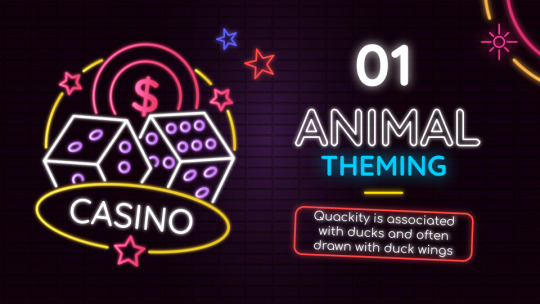
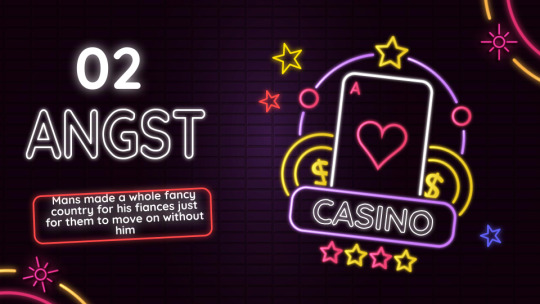
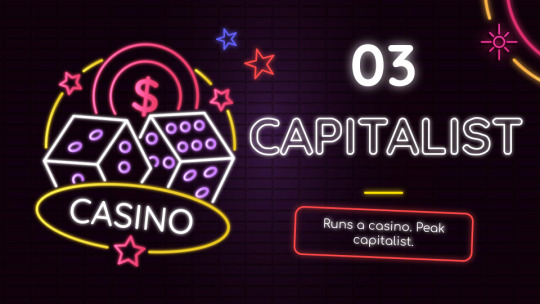


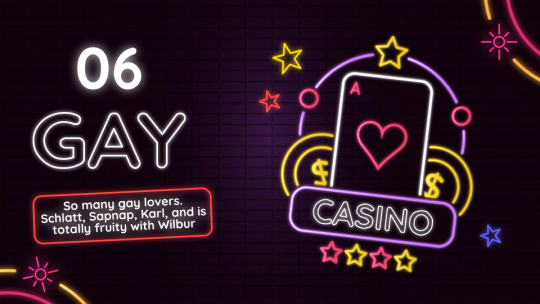

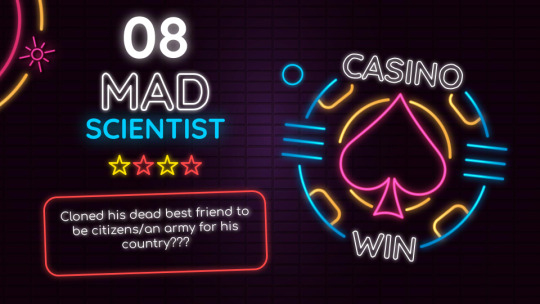

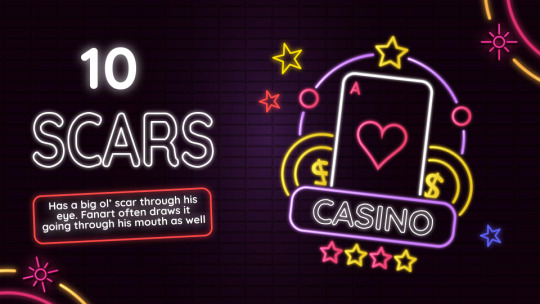

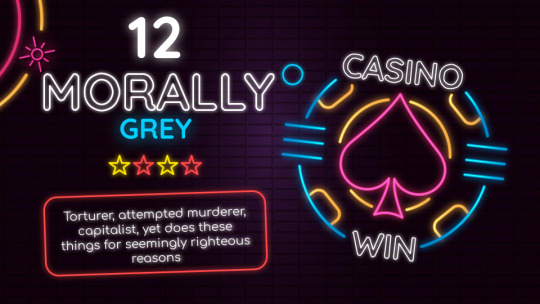


these tropes are all based on official tumblr sexyman tropes listed on the sexypedia tropes page!! it’s all legit sexyman material!! do your part!!!
#mcyt#dsmp#dream smp#quackity#mcytblr#mcytblr sexyman#mcytblr sexymen poll#RAHHHH#also i did not make this theme i took it from a free presentation theme website#dont give me credit for that lol#con says#con's edit#long post#torture mention
867 notes
·
View notes
Text
[squints at the MCU] Tony Stark has displayed more ability to weather interrogation and torture than Steve Rogers.
This is "(displayed more)(ability)," not "(displayed)(more ability)," to be clear.
(I know fiction’s depiction of torture is famously propagandafied, but in this case, it’s not about torture for information so much as physical traumas shown on screen.)
(Anyway, have a rant I did on discord the other day.)
It's not really so much about "resisted the urge to hand over information" as "survived a truly harrowing experience and still came out of it trying to do good."
Tony's very first movie involves getting repeatedly drowned while in constant pain from bomb injuries as a civilian contractor, and I… don't think I can remember anything even a little similar with Steve
I don't think he's ever been captured for long before breaking out? All his injuries are in active battle, not torture.
Like... Steve went through something horrible with the ice and losing Bucky, nobody can argue that. But I think it's very telling, sometimes, that movie Steve, especially 2012 movie Steve, is completely unaware of the absolute nightmare that Tony experienced in his solo movies.
I have so many feelings about Tony Stark being the epitome of "guy who was raised and manipulated into being a bad person by someone he trusted, and (after a horrible experience) attempts to be a better person, constantly and consistently, even if he sometimes fucks up in the execution."
And the way that some fics elide his experiences in cleaning up other people's messes (first Obadiah's, then Howard's) and how that doubtlessly compounded his many neuroses from fixing messes that he did actually create himself is just
I have a lot of feelings
And am also feeling a little bitter and salty about how Tony Stark's MCU incarnation reportedly took some inspo from Elon Musk... and a little petty and satisfied about just how drastically we've all be shown that Musk can never live up to the idea of 'billionaire with inherited wealth who actually, without hesitation, risks his own life to save millions' that he tried to use PR to achieve in the media with 'my electric cars are gonna save the world' stunts about things he didn't actually have a hand in inventing
I'm just reading some fics I really enjoyed when I was still in the YA fandom, and there was a reference to a line Steve said in the movies and I started thinking (again) about how frequently fans take lines from Steve or Sam about Tony as gospel, because they haven't seen Tony's movies, and the lines from the star spangled boys are contextually meant to show that they don't know jackshit about Tony or his life, because they are directly contradicted by multiple prior films.
Also like... how often Steve's traumas get explored (in fic) in a way that Tony's just... don't? At most, his issues about Howard get explored, but that's it.
There's this moment in CACW that people take as Accurate and it infuriates me.
Tony Stark: [Back in the cell.] Just look. Because that is the fellow who was supposed to interrogate Barnes. [He shows a holographic image of Doctor Broussard.] Clearly, I made a mistake. Sam, I was wrong.
Sam Wilson: That's a first.
Which, like... it's a bad movie. Obviously. But also
That line is immediately followed by Tony revealing that he's here to help the others and is sabotaging the security to make sure Ross can't take advantage, and yet fanfic still uses Sam's quote to promote anti-Tony agendas!
And 'Tony admits he fucked up' is. Like.
Listen to me
Tony's first solo movie is fixing Obadiah's machinations. *
His second solo movie is fixing his Dad's fuckup.
His first team movie is fixing Thor's mistakes.
His third solo movie is fixing something that is only tangentially his fault.
It's not until AoU that the fuck-up is really his and his alone (well, not counting Bruce), and even then, even then, a massive portion of the blame is narratively laid at Wanda's feet!
And only then do we get this man, who has spent five movies seeing what happens when people don't take responsibility for their actions, or have anyone riding them to be ethical, who has criticized himself for neither having that oversight nor providing that oversight for people who snuck shit under his nose, that is when we get Tony weighing in on the side of "most countries on the planet are agreeing with this and it's for a reason, please work with me here, maybe we can get some of it rolled back to be less authoritarian and more reasonable."
* and removing himself from the military industrial complex he was raised and groomed to be in, but that's a system and not an individual act or a set 'villain'
Or as @firebirdeternal put it:
I would say that his first solo movie does have a large element of fixing his own mistakes too, it's just that his "mistake" was Trusting the Wrong Person and not taking personal responsibility for how his actions are affecting the world. (Which, he immediately does upon coming back from being captured? "We're going to immediately stop making weapons, because it's making the world worse" and then when Obadiah cuts him out of the company he goes "Oh. Okay no that didn't work, have to personally fix all this then.")
and yeah it's just
Tony have plenty of reasons to be on the side of "Someone needs to have oversight over this"
IM1 is such a good exploration of someone in privilege saying "this stops now" in a situation where they do have control because they have been confronted with their mistakes in a way that's unavoidable
It's also like, a great example of the fantasy of the Super Hero. Because Tony Stark, the businessman, even with all his wealth and knowledge, isn't able to stop the systemic harm being caused by His Own Company. One person isn't able to do that, even with the best of intentions. It isn't until he becomes something else, something more, a Super Hero, that he's able to make any kind of meaningful change on his own.
Like IM1 is just a phenomenal movie. It understood it's subject material so incredibly well.
And people skip it and then take Steve and Sam at their word about Tony's strength of character and moral convictions and I scream.
THIS MAN FLEW A NUKE INTO A WORMHOLE WITH THE FULL EXPECTATION THAT HE WAS GOING TO DIE
Yeah, like, that Jump on the Grenade mentality is something that he and Steve actually literally share.
They both had 'jump on the explosive to save people' moments in their introductory movies.
I find so much more strength and inspiration in stories like Thor and Tony, where they are inherently fuck-ups and were shitty people and they are trying so damn hard to be better, which is more Tony than Thor really, but both of them and their first movies are just. I find that more inspiring than Steve or T'Challa or any other hero who was already a good person and just Became Great.
Tell me about the person who has to struggle to find that moral choice. Tell me about Natasha dragging herself from her oceans of blood and Tony fighting the government over whether they have the rights to use weapons he's created and about Thor having to reckon with his family's power being born of imperialistic ravaging of other cultures.
I want to hear about the people for whom being good is hard and a choice they don't have to make, but then they make it anyway.
Also I stand by "I am Iron Man. [infinity snap]" being the most amazing bookend the MCU could have done and probably the best part of the Endgame.
#Tony Stark#character analysis#phoenix talks#MCU#Iron Man Movies#Iron Man#Avengers#AoU#CACW#AEG#torture mention
620 notes
·
View notes
Note
Since Color sans is friends with Killer in Canon does Color like get special treatment or something from cat Killer? Such as like being able to pet Killer on the stomach or something without needing to worry about getting their hand trapped? Random I know but I'm curious:3
-Anon
He used to.
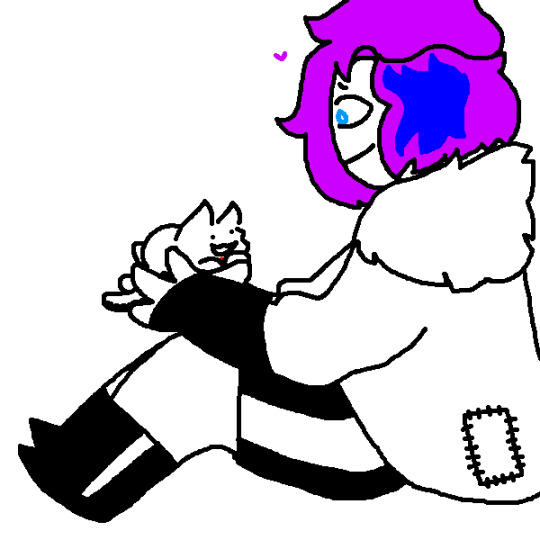
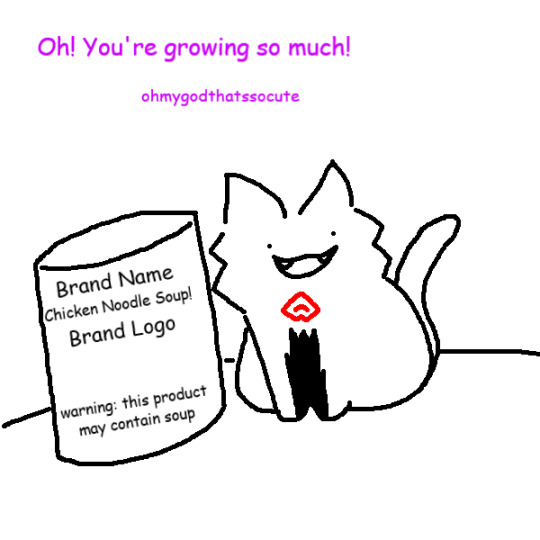
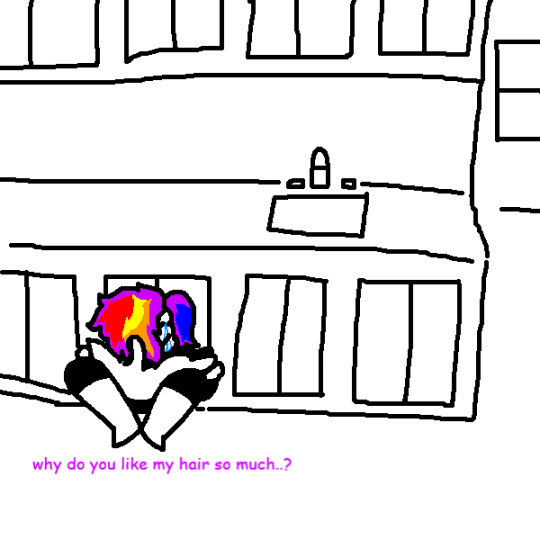
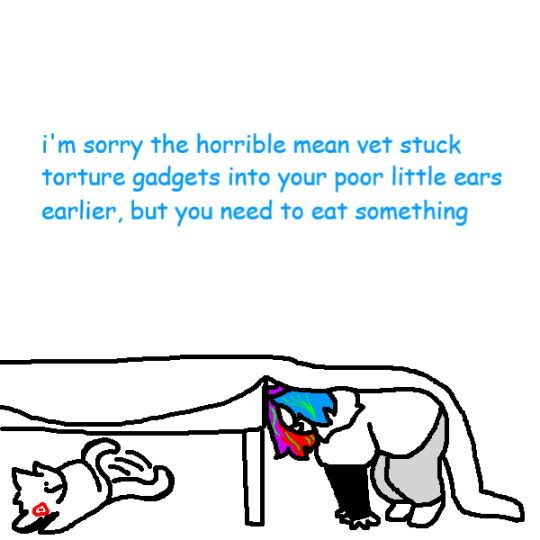
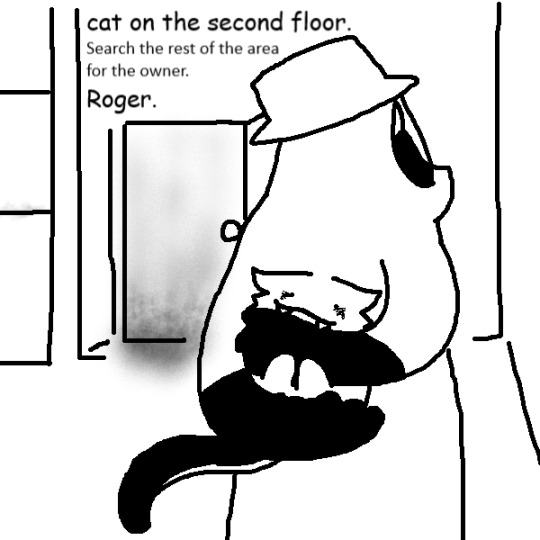

Soup Can: Brand Name | Chicken Noodle Soup! | Brand Logo | warning: this product may contain soup
Color: Oh! You're growing so much!
Color: ohmygodthat'ssocute
Color: why do you like my hair so much..?
Color: i'm sorry the horrible mean vet stuck torture gadgets into your poor little ears earlier, but you need to eat something
Firefighter: cat on the second floor
?: Search the rest of the area for the owner.
Firefighter: Roger.
Killer: (where's my human?)
#color sans#killer sans#cat#food#<- the soup can#torture mention#implied fire#death#implied death#both. yes#his name in this au wasn't really color that was just what Killer thought of him as because of his hair#queue
94 notes
·
View notes
Text
concept: grizzled badass action hero with a missing body body part
for a long time it's never explained how they lost that body part. maybe everyone's too intimidated to ask them. or maybe people do ask and they tell different, increasingly outlandish story every time. sword fight. rescuing a baby from a burning building. tortured for information. caught in a bear trap and had to gnaw it off.
eventually it's revealed that nah, there was no accident, it's congenital
#eliot posts#posts written by congenital amputee gang#my fav hobby as a kid was making up bullshit stories when ppl asked me what happened to me#and seeing how long i could go before they called my bluff#now that i'm an adult folks don't ask me so much anymore#injury mention#limb loss mention#torture mention
98 notes
·
View notes
Text
The Informant
next >
TW/CW: death threat, vague mention of torture
"I hope your intel is right, traitor, or it'll be your head!"
Caretaker ignored Team Leader's threats, feeling he rightfully deserved them. "This may be the last chance you get to rescue him, it has to be tonight."
The rest of the Team fanned out around the enemy base, with Team Leader, Lieutenant, and Caretaker stationed at a vantage point, watching for the perfect moment to strike.
Honestly, everyone on the Team was surprised when a member of the enemy came to them a couple months ago unarmed, waving a white flag, with information on Whumpee.
"I don't care what happens to me, just -he can't take much more of this. What my superiors are doing -" Caretaker shook his head. He took a moment to compose himself, inhaling and exhaling a shaky breath. "Please, help him," he insisted, "before it's too late, before there's nothing left to help."
Tagging @whumperofworlds who wanted to see where I went with this idea that's been living in my head rent-free. It was supposed to be longer (by about 2 more paragraphs, at least) , but I lost the original document T-T. And, because I'm bad at naming things, I just rewrote it from scratch rather than scroll through my docs one by one in search of the original . In any case, it'll probably materialize on its own one night at one in the morning.
Part Two because I stopped being a fucking doorknob and found the original document
84 notes
·
View notes
Text
Me: So how do I torture my OC?
The whole ass community: *gives me a list of heinous ways to hurt my OCs like a shopping list*
Love this community ❤️
218 notes
·
View notes
Note
if you have any more thoughts on the Joker Junior extending the family take I'd love to hear them!! Would J be interested in having Nightwing with them? Or Alfred? I'm not sure how well either of them would take to the venom, but if they have Batman anything's possible
Less ideas and more of an actual fic, oopsie!
---
Three weeks. Three long, agonizing weeks without Tim. Three weeks of hoping beyond all hope that he was somehow fine. That they'd all look back on this and laugh.
But, no. Eventually, Bruce was able to get word that The Joker and Harley had holed themselves up in the abandoned Arkham Asylum, and something in his gut that made him sick knew there was some correlation.
Part of him hadn't wanted Barbara to come along, but he also knew he wouldn't be able to stop her even if he tried. So, the two of them traversed through the crumbling asylum together and followed the echoing sound of Harley's voice singing a lullaby.
“Hush, little baby, don't say a word,
Mama's gonna buy you a mockingbird,
And if that mockingbird don't sing,
Mama's gonna buy you a diamond ring….”
Closer, closer. It took both of them every bit of will they had not to sprint through the halls as fast as their legs could carry them. As Harley’s voice grew even louder, Barbara split up to find another way in while Bruce took the lead. His heart nearly leapt from his chest with anticipation as he closed in on her location.
“And if that diamond ring is brass,
Mama's gonna buy you a looking glass,
And if that looking glass gets broke-”
The moment Harley saw him burst through the double doors, she perked up, greeting Bruce with a smile. She was cradling a flower vase in her arms, which she set down onto a covered table. Craning her neck, she shouted over her shoulder. “Puddin’, Hubby's home!”
Bruce’s eyes followed Harley’s gaze, spotting Joker on the second floor where he rested on a recliner. With a flourish, The Clown rose to his feet, turning away from his rabbit-eared television set and popping a pipe from his mouth, tossing it aside.
“Well, hello, dear!” Joker strolled down the stairs, stopping just shy of Batman. He wrapped an arm around Harley, the two of them smiling sweetly at their bat. “Welcome home.”
Bruce all but snarled in their faces, leaning close and baring his teeth. “Where's Robin?”
Both clowns shared a quizzical look.
“Robin?” Joker repeated with a quirk of his head. “There's no Robin here!”
“Maybe he means our little J,” Harley offered.
The Clown Prince of Crime snapped his fingers. “Of course! That's it.”
Meeting the Bat's eyes, smiling back at his scowl, Joker gestured to the other side of the room. To whatever was being concealed behind the large blue curtain. And Bruce couldn't help his rage, shoving the couple aside roughly as he moved to cross the room.
The Joker stumbled back, recovering with the shake of his head and click of his tongue. “He must be so stressed out from work.”
“I hate it when he gets like this. He never knows when ta relax,” Harley shook her head and reached underneath the table, pulling out a bazooka from beneath the tablecloth. She fired, and a band of ribbons erupted from the muzzle, knocking Batman to the floor with a hard thud and wrapping him up like a gift - bow and all.
“Good thing he has us. Hmm, now what say we bring this little gift of ours back to the bedroom to unwrap?”
Joker's grin stretched just a little wider as he noticed the movement of Batman's hand - holding it up just so as if to signal someone, just out of eyesight, to stand down. Joker's eyes crinkled. Perfect. He wondered, was it the eldest birdboy? Or maybe they'd be getting two bats with one stone?
“Y'know, Bat's, we've been doing this little run around for years,” Joker spoke again, approaching his prone enemy. “It's been loads of laughs! But the sad fact is - none of us are getting any younger.”
Harley joined his side, patting her stomach. “That ol’ clock's a tickin’!”
“Quite right, Pooh! So, Harley and I were thinking it's about time the three of us finally settled down together.”
“But rather than experiencing the joys of pregnancy, we decided the best way would be to just marry into the family.”
Hand-in-hand, the clowns walked over their Bat's prone form to each rest a hand on the curtain in front of them.
“But no matter how happy we are to join you, we were a bit disappointed that we didn't really have the chance to nurture them, too,” Joker lamented. “And after all, what better way to officially join the family than to impart a little bit of our personalities to the kiddos? He needed a bit of molding, of course, but-”
The couple yanked on each side of the curtain, the blue cloth sliding and billowing out as it parted - revealing a child strapped to a medical examination table.
“... What kid doesn't?” Joker finished with a grin, drinking in the Dark Knight's reaction.
Bruce couldn't help the exhale of ‘no’ that left him. Couldn't even blink, too horrified to look away from what had been done to Tim. The horror set in all at once, like freezing water flooding through every nerve in his system.
Joker brought Tim forward with the click of a button, the table rolling forward and bringing the boy into the light.
Tim...
His face an acid-washed white. His hair an unearthly green. His Robin costume now replaced with an exact recreation of Joker's own suit. And his face… Contorted in a pained smile and his eyes wide and afraid, unblinking.
“Say hello to Dada, JJ,” Joker cooed.
Tim's eyes, seeming to glow red in the light, shifted from Joker to Batman. He leaned further into the light, locking eyes with Bruce, and laughed. He laughed in a way Bruce had never, ever heard before. He unbound himself from the table, leaping to the floor on scrawny legs - God, how much weight had he lost in such a short amount of time. What had they done to his boy?
All at once, the cold shock and dawning horror inside Bruce shifted - and his whole body was alight with rage, like a fire inside threatening to escape through every orifice as he ripped through his bonds. The shout he made was near inhuman, launching a batarang he had cut the ribbons with directly at Joker's head, only for the Clown to dodge it with ease.
Harsh giggles flooded from Joker's throat, wiggling a finger in a ‘come hither’ motion before jumping onto the now vacant medical table, rocketing off with the click of a button, causing Bruce to almost stumble and reorient himself to take off after him - and leaving Barbara to deal with Harley.
—
Giggles bubbled from Tim JJ's throat as he stared unblinkingly down at his father, body crumpled on the floor, cape draped almost protectively over his prone body. And with giddy glee, The Joker Papa J hopped down from the giant building blocks he was perched upon, where he had sliced at Batman and sent him tumbling down only seconds ago.
It was all a blur for Bruce. The chase. The horrific videos of Tim… Tim's torture. Three weeks. Three weeks of that Hell. Electrocution. Beatings. Torment. Starvation. And it was all his fault. He'd failed him. The rage that had filled him nearly completely, made him seen red, had all been snuffed out.
First Jason. Now Tim. And Bruce still couldn't bring him to end this. His vision swam, and he could barely even focus. Not on Tim. Not on the man who tortured him. But… Wait. Where was-?
With a final hop, Joker landed in front of Batman in a crouch, hovering over him with a sly grin.
“You've lost, Bruce,” He rasped, and just hearing the name on the clown's lips made JJ seize up, his forever-smile momentarily twitching and a flood of nervous giggles escaping him. The clown continued, voice low. “Robin is mine… And now, so are you.”
And with a hearty heft, Joker lifted Bruce up by the scruff of his cowl and cape, as if presenting him. The grin of his face, the look in his eyes, as he looked down on his enemy. So proud of himself, so smug.
And Bruce. He looked in a daze, lost and beaten. Blood dripped from his lips.
This isn't what Papa promised. He said everything would be okay now. That he'd see Dad and Dick and Babs and Alfred again and he wouldn't be mean or hurt him again, because Papa knew he would be good now…
But when Joker met his eyes, something in them changed - his smile warping to somehow become comforting, happier. The darkness in his eyes dissipated, replaced with an excited shine. And with a free hand, The Clown grabbed for a large gun that looked more like a toy than anything.
“Here ya go, sonny-boy!” He said, tossing the weapon.
JJ scrambled forward to catch it. He couldn't help but notice how light the gun felt as he cradled it in his shaking, gloved hands. For a moment, he couldn't look away.
“Make him one of us,” The Joker urged, voice like a hiss.
It wasn't a conscious decision to aim the gun. It just happened. Like one minute, JJ was there and gone and back again. His hands shook so hard that he could hardly keep the weapon straight. Could barely even look at him. At the mask. At the man behind it.
“Tim…” Batman breathed. JJ had never heard his voice sound so small.
JJ would swear he couldn't breathe if it weren't for the rapid rise and fall of his chest and the wheezing, giggling exhales that escaped him as he struggled to calm down. Tears threatened to pool from his eyes.
This wasn't right. But, Papa knows best. He said everything would be okay afterward. He said he wouldn't be punished again. But, he couldn't. But, he couldn't run, either - too scared. Too weak. He wanted to be home. He wanted his family. He wanted to stop crying, to be able to breathe, to run into his fathers’ arms-
“It's alright now, JJ,” The Joker soothed, recapturing the boy's attention. “Just pull the trigger, and everything will be okay.”
JJ wanted his Papa to be telling the truth. He just wanted everything to be okay. He just wanted it all to stop. Bruce, please forgive him.
His finger squeezed around the trigger-
Joker's laugh filled the room, just as a green mist began flooding from the gun’s opening. It spread through the air and quickly covered both men. Joker laughed long and loud as he clung to Batman. He pulled his Bat into an embrace, a smile so bright and wide it made the corners of his mouth rip, as Bruce began to choke and hack.
The man seized up and shook in Joker's arms. Slow at first, but soon trembling and writhing in agony, barely restrained and pained chuckles escaping him. So much hurt flooding through every nerve and system that almost faculties left him. His lungs burned, his face ached, he couldn't feel his extremities and wouldn't have been able to hold himself up without Joker's hold on him. Bruce wasn't sure if he could speak or even breathe anymore, but somehow his body found it in itself to betray him, forcing laughter from gritted teeth.
Joker took a knee, gently laying Batman to the ground. The bat spasmed and jerked. Tears began to fall from behind his mask, shining on his cheeks in the light. Gloved hands caressed the sides of Bruce's face. Green eyes glinted in the light as they watched each movement of the other man - every sputter, every gasp, every choked out laugh, every pained, slowly blooming smile that wobbled onto his face.
“You must be so scared, aren't you, sweetheart?” Joker cooed. “You've been scared this whole time, haven't you? Ever since that night in the alleyway...”
Batman didn't reply - couldn't. His eyes crinkled as his smile grew involuntarily. All he could do was return the man's gaze with a manic smile that wasn't his own.
Joker stroked the top of his cowl lovingly. “But it's okay now, Bruce. You don't have to be scared anymore. You don't have to be strong. Don't have to hold yourself back. Me and Harl will build you back up to what you were meant to be. We'll be brave for you now. And do you know why?”
Bruce couldn't respond. For one, the agony of whatever this was, whatever Joker had planned for him, blotted out almost all thoughts in his mind completely. Could only tremble and writhe and cry and laugh. Laugh. Laugh. The laughing made it hurt just a little less. But he could still barely even register what the other man was saying. What he could register, though, was the image of Joker slowly leaning down to press his lips to Bruce's cloaked forehead.
“Because we love you.” Joker finished.
—
“Ohhhh, Harley!” Joker's voice rang through the cavernous halls of the abandoned asylum. “Barbie's turn!”
Barbara's stomach sunk to her feet and her heart skipped a beat. Barbie? No. No, there was no way, he could have known her name. Oh God, what happened to Bruce-?
In the middle of her ruminations, Harley caught her by surprise. A jab to the face, the pull of her leg to trip her up leaving her scrambling to correct her fall- only for her to feel hand grasp tightly at the nape of her neck, coiling painfully at the root of her hair. She was shoved onto her stomach, face-to-face with the dirty, cracked tiles of the former asylum’s floor.
“You know what that means! C'mon, Barbie,” Harley grunted, fingers twisting in the roots of her hair. She lunged forward, slamming her face to the floor with a sick crunch. “Let's go party!”
And everything went dark.
… Barbara awoke with a groan. The smell of pennies flooded her nostrils. Her vision was bleary and swam as she struggled to open her eyes.
A dark figure entered her vision from her periphery, and it loomed over a figure clad in purple. And for a moment, just one moment, she allowed herself to hope.
But, that hope crumbled just as quickly as Joker's voice entered her ears.
“You're okay, Bruce, you're okay, sweetie. You're gonna play nice now, right?”
Barbara couldn't help but shudder at the sound of Bruce's laugh in reply.
Hands found their way to Barbara's hair again, this time much softer. Not grabbing, just brushing and stroking almost soothingly.
“Wakey, wakey, eggs ‘n bakey,” Harley sang as she carded her hands through the younger woman's hair. “Y'know, I've always wanted a daughter. A little girl of my own. You think you'd ever want Mama to braid your hair for you? It's so pretty!”
“Ah, welcome back to the land of the living, Barbie,” Joker greeted. “Your Dad and I were just talking about you. A real chip off the ol’ block. Now all we need is to make it official.”
Barbara watched as Tim approached Bruce, pushing a gun of some kind into his hands. The Batman held it in his hands, smiling down at the weapon - but seemed almost hesitant. Unsure. Like he knew this was wrong. Like the weapon would somehow come alive and bite him.
“Batman, listen to me,” Batgirl pleaded. “Don't do this. Whatever they've done to you, this isn't you.”
“Oh, but it is! And soon it'll be you, too,” Harley corrected, walking back to give herself some distance.
“I know you're torn, Batsy, but I promise this is for the best,” Joker rubbed circles into the other man's back. “We'll all finally be together. Once we get Barbie here, then we'll get Dick and Al. And we'll be a family! They'll never be hurt again. You'll never be hurt again, sweetheart. I won't let anything bad happen anymore. You'll get your happily ever after. You won't be afraid ever again, I promise.”
Tears stung at Barbara's cheeks as she begged. “Batman, please!”
And for a moment, she thought she somehow got through to him. They locked eyes and Bruce smiled at her with a smile that isn't his own. But, she thought she could see understanding or recognition or something in his eyes, and was sure he'd toss the gun away and start kicking Joker's ass.
But, she was wrong.
With a hiss, green toxin flooded all around her. Even over her screams, the sounds of Joker, Tim, Harley, and Bruce's laughter smothered her completely. And soon after, so did her own.
#yandere x character#poly Yandere#familial yandere#platonic yandere#batjokes#batjarley#batjoquinn#torture mention#torture tw#torture cw#child abuse mention#child abuse tw#child abuse cw#child abuse ment cw#yandere x character x yandere#joker junior#joker jr#batman beyond: return of the joker#yandere#yandere joker#yandere Harley Quinn#yandere Harleen Quinzel#jokerized#blood
76 notes
·
View notes
Note
JAT: "I love horror so much! Unless it contains gross, immoral content like incest, rape, sex scenes, nudity or partial nudity in any shape or form, child death, jump scares, domestic abuse, torture (note: unless it's a woman torturing a man, they seem to be totally fine with that), swearing, or excessive gore. It's not REAL horror if it depicts these things! It's just for shock value and to be as excessive as possible!! Anyway I love horror so much uwu"
every damn time

#mod erin#ask#just anti things#incest mention#rape mention#death mention#child death mention#torture mention#abuse mention#domestic abuse mention#gore mention
77 notes
·
View notes
Text
#polls#poll#my polls#my poll#tw death#death mention tw#tw torture#torture mention#death mention#tumblr poll#hyper specific poll#spies are forever#saf#tcb spies are forever#agent curt mega
187 notes
·
View notes